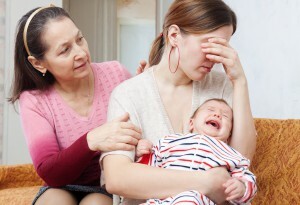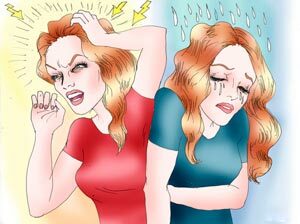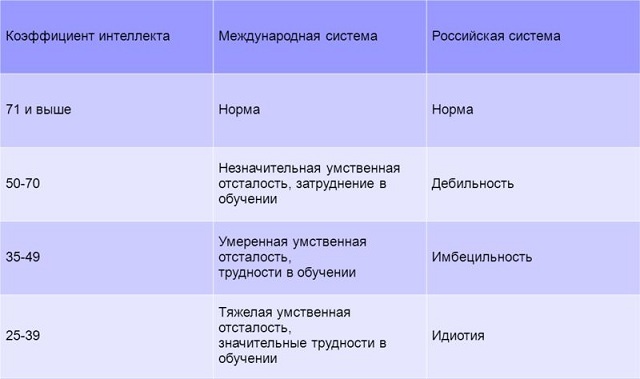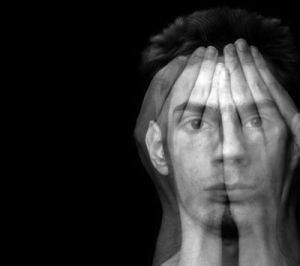 After the birth of a child, sometimes a woman becomes nervous, refuses to go out, is constantly worried about her baby and even afraid to let anyone come to him. This condition is called postpartum psychosis.
After the birth of a child, sometimes a woman becomes nervous, refuses to go out, is constantly worried about her baby and even afraid to let anyone come to him. This condition is called postpartum psychosis.
This is a fairly rare mental disorder that occurs in young mothers who have experienced difficult births. The peculiarity of the postnatal symptom may be that during the manifestation of the disease a woman develops certain mental deviations that do not appear before pregnancy. Often this bipolar disorder, a little less often - schizophrenia.
Contents of
- Who is at risk and why?
- What does a typical
- patient look like? What are the symptoms of
- ?
- What should relatives do?
- Possible Dangers
- Warning and armed with
Who is at risk and why?
The reasons for the development of postpartum psychosis in some women have not been fully studied to the present day, but the following factors predispose to the appearance of the disorder:
- severe labor( in some cases, pregnancy);
- large blood loss during the birth process or sepsis;
- hereditary predisposition;
- is available in a future mother's mental disorder before pregnancy.
Based on the factor that triggered the onset of postpartum psychosis, its types are distinguished:
- manic-depressive;
- depression after childbirth;
- schizophrenia;
- is a mixed schizoaffective condition.
How does a typical patient
look After discharge from a maternity home, a woman with postnatal psychosis is already slightly depressed and unbalanced. To the child, she can refer to  indifferently or to express dislike. Attitude to all others also changes radically. Without listening to the maternal instinct, a young mother can ask her relatives to take her child to the baby's house, claiming that she is not able to raise and educate him.
indifferently or to express dislike. Attitude to all others also changes radically. Without listening to the maternal instinct, a young mother can ask her relatives to take her child to the baby's house, claiming that she is not able to raise and educate him.
There is also a cardinally opposite situation when a woman takes care of a child too much: she worries about the cause without reason, looks for non-existing diseases in the baby and tries to cure them without listening to experts who say that his health is ok.
Such a patient does not admit to anyone absolutely anyone, constantly afraid that the child will fall ill and die.
Symptomatic features of
Postpartum psychosis can occur in mild or severe forms, the main symptoms of either of these are as follows:
- Maniacal inclinations of .Overexcitation, which is characterized by the appearance of obsessions and thoughts, often without any real reason. Paranoia can begin, or the woman has megalomania.

- Auditory hallucinations is one of the most common symptoms of postnatal psychosis.
- The change of personality and thinking .Women who started the disease can not formulate their thoughts. Their conversation is mostly incoherent and inconsequential.
- Impossibility of an adequate assessment of its condition .This is the reason that it is difficult for relatives to inform a woman about her illness and convince her of the need for treatment.
- Loss of appetite .
- Appearance of suicidal thoughts and inclinations .This symptom indicates that specialists can not do without the necessary help.
Assisting
The selection of medications for the treatment of postnatal psychosis is performed depending on the symptomatology of mental retardation.
During treatment of postpartum psychosis, women can be assigned: 
- neuroleptics to relieve the patient of delusions and hallucinations( haloperidol, aminazine, triftazin);
- antidepressants , able to eliminate the depressive state( amitriptyline, fluoxetine);
- normotimiki , helping to make the patient's mood stable( Valproate sodium, carbamazepine).
In exceptional situations, electroconvulsive therapy is used.
If a young mother has any other illnesses, it is necessary to conduct their therapy in parallel, so as not to aggravate the course of the disease.
What should relatives do?
The main thing that is required from relatives - in time to be close and give a woman, faced with postnatal failure in the psyche, their love, support and care.
 If a woman suffers from this disease and does not behave adequately, aggressively against her baby - it is necessary to isolate her.
If a woman suffers from this disease and does not behave adequately, aggressively against her baby - it is necessary to isolate her.
It is extremely important that at this moment there is always a person in control of her actions. If a woman tries to make attempts to harm herself or others, she will have to urgently call for emergency psychiatric care.
In cases when the patient takes medication to eliminate the symptoms of the disease, it will be necessary to ensure that the baby has switched to artificial feeding.
Possible dangers of
If postnatal depression often goes by itself, without consequences for the body, then postnatal psychosis poses a great danger.
If not in time of the begun therapy the postnatal psychosis can have irreversible consequences. The most terrible of them is that a sick woman can hurt herself, as well as her baby. There have been cases when, after giving birth, women and girls tried to commit suicide or take the life of a newborn child, absolutely not giving an account of their actions.
Forewarned and armed with
In order to protect herself from possible postpartum psychological and psychological problems, a woman needs to prepare for delivery both physically and psychologically during pregnancy.
It is recommended to enroll in the courses of expectant mothers, where the pregnant woman will be taught the proper breathing technique and caring for the future baby. Also, these courses provide an opportunity to talk with women who have already taken place as mothers, and will maximize their mood for the upcoming appearance of their own baby. 
Specialists note that those women who undergo courses of expectant mothers significantly reduce the risk of postpartum psychosis, because they prepare in advance for the difficulties of motherhood.
Pregnant women who are at risk for developing the disease are advised to consult a therapist for prevention purposes. This will help minimize the risk of its occurrence.
The above mentioned methods of prevention are extremely important, because until now there is no one hundred percent method for preventing postnatal psychiatric failures.
In addition, you should always listen to your doctor, avoid stressful situations and emotional shocks, provide the body with a full sleep and rest.
If a woman is at risk of developing a disease, it is better to warn the father of her future baby in advance. This will help him to be morally ready, to provide his support in time and seek help from competent doctors if the postpartum psychosis overtakes his wife.



